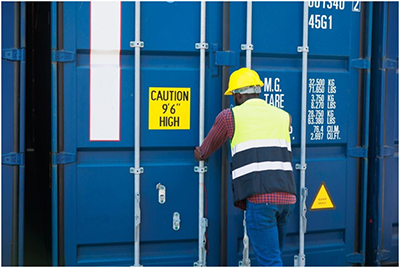(17 September 2024)
Shipping goods across the globe is a complex task that requires careful planning, especially when it comes to items that pose potential hazards. These items, commonly known as dangerous goods, require specialized handling and transportation to ensure safety. Whether it's chemicals, flammable materials, or even everyday products like batteries, transporting these items requires expertise and stringent regulations. This is where a logistics company like System8 Logistics Group, with experience in dangerous goods shipping becomes invaluable.

What Are Considered Dangerous Goods?
Dangerous goods are substances or items that can pose a risk to health, safety, property, or the environment. These items are categorized based on their physical and chemical properties, which determine the type of hazard they present. Here’s a breakdown of the main categories:
1. Explosives
Explosives are materials that can detonate or rapidly combust. This category includes items like fireworks, ammunition, and certain chemical compounds. Due to their volatile nature, explosives require careful handling and specific storage conditions to prevent accidents.
2. Gases
Gases can be dangerous in various ways, including being flammable, toxic, or corrosive. Examples include propane, chlorine, and compressed air. The risks associated with gases are not only from leaks but also from the pressure they are stored under, which can lead to explosions if mishandled.
3. Flammable Liquids
Flammable liquids, such as gasoline, alcohol, and acetone, can easily ignite and cause fires. These materials need to be stored in temperature-controlled environments and transported in containers designed to prevent spills and leaks.
4. Flammable Solids
Flammable solids are materials that can catch fire easily or even spontaneously combust under certain conditions. Examples include matches, sulfur, and certain metal powders. These items are particularly risky during transportation due to the possibility of ignition from friction or heat.
5. Oxidizing Substances
Oxidizers are chemicals that can cause or enhance the combustion of other materials. This category includes substances like hydrogen peroxide and ammonium nitrate. When shipping oxidizers, it is crucial to keep them away from flammable materials to prevent accidents.
6. Toxic and Infectious Substances
These include chemicals and biological agents that can cause harm to human health. Examples are pesticides, medical waste, and certain pharmaceutical products. The transportation of these goods requires adherence to strict regulations to avoid contamination and exposure.
7. Radioactive Materials
Radioactive materials are substances that emit radiation, which can be harmful to living organisms. This category includes items like medical isotopes and certain types of industrial equipment. Shipping radioactive materials requires specialized containers that shield against radiation.
8. Corrosives
Corrosive substances can cause severe damage to living tissue or other materials upon contact. Examples include strong acids, bases, and certain cleaning agents. These items must be transported in containers that prevent leaks and are resistant to corrosion.
9. Miscellaneous Dangerous Goods
This category includes items that don’t fit neatly into the other classifications but still pose a significant risk. Examples include lithium batteries, dry ice, and magnetized materials. These goods require unique handling procedures to mitigate their specific hazards.
Why Is Dangerous Goods Shipping a Necessary Service?
Transporting dangerous goods is not just about getting items from point A to point B; it's about ensuring that the journey is completed safely and in compliance with international regulations. Here’s why specialized dangerous goods shipping services are crucial:
1. Regulatory Compliance
The transportation of dangerous goods is governed by strict international regulations, such as the International Maritime Dangerous Goods (IMDG) Code and the International Air Transport Association (IATA) Dangerous Goods Regulations. These regulations dictate how dangerous goods must be classified, packaged, labeled, and transported. A logistics company specializing in dangerous goods shipping understands these regulations and ensures compliance, avoiding legal repercussions and fines.
2. Safety and Risk Management
The inherent risks associated with dangerous goods require specialized knowledge and equipment to manage. A professional logistics company ensures that the correct procedures are followed, from packaging and labeling to loading and transportation. This minimizes the risk of accidents, such as spills, leaks, or explosions, which could have catastrophic consequences for public safety and the environment.
3. Expertise in Handling Specialized Cargo
Different types of dangerous goods require different handling procedures. For example, the transport of flammable liquids might involve temperature-controlled vehicles, while radioactive materials require lead-lined containers. A logistics company experienced in dangerous goods shipping has the expertise to handle these specific requirements, ensuring that the goods arrive safely and in compliance with all relevant regulations.
4. Emergency Response Preparedness
Despite all precautions, accidents can still happen. A logistics company specializing in dangerous goods shipping is prepared for such scenarios with emergency response plans in place. This includes having the necessary equipment and trained personnel ready to handle incidents, such as chemical spills or fires, ensuring that the situation is contained quickly and effectively.
5. Insurance and Liability Coverage
Transporting dangerous goods involves significant liability. In the event of an accident, the costs associated with damage, cleanup, and legal claims can be substantial. A logistics company that specializes in dangerous goods shipping typically carries specialized insurance that covers these risks, providing peace of mind to both the shipper and the receiver.
6. Customs and Documentation Assistance
Shipping dangerous goods across borders adds another layer of complexity due to varying regulations in different countries. A logistics company experienced in this field will handle all the necessary customs documentation, ensuring that the shipment clears without delays. This includes preparing the correct shipping papers, such as the Dangerous Goods Declaration (DGD), which is required for international shipments.
Conclusion
Shipping dangerous goods is a task that requires expertise, precision, and adherence to strict regulations. Whether it’s explosive materials, toxic chemicals, or flammable liquids, the risks involved make it essential to choose a logistics company that specializes in dangerous goods shipping.
DubaiCityGuide.com is owned and managed by Cyber Gear 




